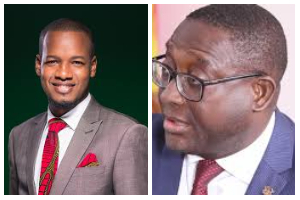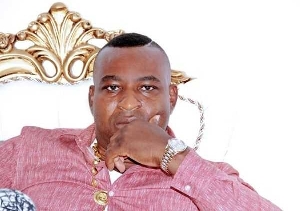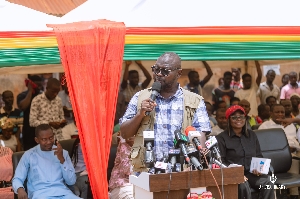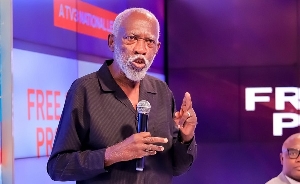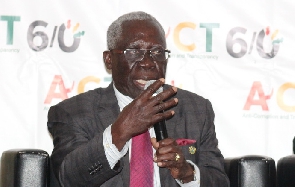 Dr. Eke Agbai, Executive Vice President, Center for Policy and Foreign Engagement, Abuja Nigeria
Dr. Eke Agbai, Executive Vice President, Center for Policy and Foreign Engagement, Abuja Nigeria
“Today’s headlines and history’s judgment are rarely the same. If you are too attentive to the former, you will most certainly not do the hard work of securing the latter”- Condoleezza Rice.
This paragraph from Condoleezza Rice’s (former America Secretary of State
under President Bush 43rd President) memoir - “No Higher Honor” sets forth the tone and structure of this discourse.
Let me start by categorically stating that the international law cum diplomatic doctrine that governs international relations is so crystal clear that diplomatic immunity extends to persons and property within the premises of an embassy of an accredited nation-state.
It, therefore, came as a disturbing violation when reports emerged and confirmed that the building of the Nigerian embassy in Ghana was demolished, an act even at its barest minimum is tantamount to unprovoked aggression against a state by a friendly nation. This is a clear breach of diplomatic immunity with its concomitant protection.
Following this incident, not a few, even from high quarters, not excluding the leadership of the Nigerian parliament, have called for immediate revenge or retaliation. I take the view that retaliation will be an ill-wind which will blow us no good, even as I condemn that act in its entirety.
In international relation, let me conceptualize the phenomenon of revenge and
attempt to identify three conditions that may demand a state (in this instance Nigeria) to take revenge against any harm.
Permit me to situate this discussion on retaliation within the broader context of emotions in international relations.
In contemplating revenge, a nation-state looks at the combination of 3
interrelated and mutually constitutive variables:
- The degree to which a nation-state emotionally experiences harm against it as morally outrageous;
- The extent of humiliation the harmed state feels;
- The degree to which international retaliation is institutionalized by rules and laws that govern the use of force.
In considering the above, our shared colonial history, antecedent with Ghana
and cordiality over the years cannot be ignored.
Secondly, the foreign policy of any nation is dictated by core national economic interest, inter alia. Nigerian foreign policy (vis-a-vis Ghana) is anchored primarily on African unity and her capability to experience hegemonic influence as a regional power. Inherent in this foreign policy thrust is the peaceful settlement of disputes and promotion of regional economic cooperation, integration, and development.
In addition to our shared colonial history, culture and common heritage,
Ghana and Nigeria relations started long before independence, forged and
cultivated by our great heroes past. Dr. Kwame Nkrumah, Ghana’s first President after independence in 1957, and Dr. Nnamdi Azikiwe, Nigeria's first President after independence in 1960, both attended the University of Pennsylvania in the USA.
In 1959, at the elite military school at Sandhurst in England, the following great men of our two countries were trained alongside as cadets. From Ghana were Late General Fred William Kwasi Akuffo, former Ghanaian Head of State who was killed by firing squad following 1979 revolution in Ghana by the Armed Forces Revolutionary Council (AFRC) headed by Jerry J. Rawlings, General Robert Ebenezer Abosey Akotei, who was former Chief of Defence Staff and member of Ghana Supreme military council, also killed by firing squad by J.J. Rawlings AFRC as a consequent of the revolution, Lt. General Joshua Mahamadu Hamidu, former member of Ghana’s Supreme military council and later National Security Adviser to President John Agyekum Kufuor in 2001, and later Ghana ambassador to Nigeria in 2005; and on the Nigerian side, Lt.Col Chukwuma Nzeogwu, who was said to have spearheaded the 1966 coup in Nigeria, Col Hassan Katsina, General Murtala Mohamed, former Nigerian Head of State who was assassinated in 1976 during a failed military coup, Col. Udeaja, Col. Chukwuka, Col. Ezeugbana, amongst others.
During President Obasanjo’s tenure, Ghana received a special relationship status so much so that President Kufuor was often seen taking sides with Obasanjo during regional or international debates. In fact, President Obasanjo remains one of the most trusted international election observers during Ghana presidential elections. Ambassador Hamidu can attest to the special and preferential treatment accorded to him by President Obasanjo during his tour of duty.
During President Jerry J. Rawlings’ administration in Ghana and General Ibrahim Babangida (IBB) administration, Ghana and Nigeria enjoyed a mutually beneficial relationship, which tried to heal the hitherto existing bad diplomatic relation between the two nations. I will come back to this later. The relation among these two nations was so good that during IBB reciprocal visit to Ghana in 1989, the state reception was so elaborate that the PNDC declared it as a watershed in Ghana/ Nigeria relation.
Did the relation between our two countries ever experience any skirmishes or lugubrious moments? Yes, it did. In 1969 for example, Ghana Aliens Compliance Order (GACO) enacted by Prime Minister Kofi Abrefa Busia forced the repatriation of about three million (3m) Nigerians out of Ghana. That caused lots of resentments, anger, and ill feelings among Nigerians then. Remember Nigeria was going through a civil war then and thus was experiencing terrible hardship. The repatriation was seen as a hostile treatment by a supposedly friendly nation.
Conversely, in 1983 in what seemed like a retaliation, though no evidence to support that assertion, when General Muhammadu Buhari took over as Nigeria Head of State through a military coup, over 1.2 million Ghanaians were expelled from Nigeria. That episode gave birth to the ugly history of Africa’s most famous bag” GHANA MUST GO”.
It is, therefore, an irony of event to observe that it was during General Buhari military administration in 1983 that “Ghana must go” occurred and it is also during President Buhari civilian administration in 2020 that another ugly episode with Ghana is taking place with the demolition of its embassy building. Let me make haste to dismiss this as a mere coincidence.
Interestingly, in 1988, former Presidents Jerry Rawlings and Ibrahim Babangida signed a pact leading to a joint commission for cooperation between Ghana and Nigeria. Today, over one million Nigerians live in Ghana, doing substantial business and adding to the country GDP; many Nigerian students are attending universities in Ghana and injecting into the economy huge amount of foreign currency; most huge real estate companies are Nigerian owned, helping with Ghana housing and infrastructural development; Most of the international major banks in Ghana are of Nigerian extraction. Recently oil was discovered in Ghana, she is counting on Nigeria to extend helping hands through financial cooperation and capacity building as Nigeria is a major player in the industry. This is just to mention but a few.
President Nana Akufo- Addo of Ghana was quick to tender an unreserved apology to the government and people of Nigeria immediately after the demolition incident. Irrespective of any blame on the part of Nigerian embassy staff as credited to Nigerian Foreign Affairs Minister, Chief Geoffrey Onyeama in the social media to the effect that the land on which the embassy building stood was purchased in the year 2000 but the title deeds were not processed and proper building development plan not obtained prompting the demolition.
Be that as it may, I am still of the view that diplomatic immunity and protection should have provided the necessary cover. Protection of the property would have been the responsible cause of action.
All considered, this attempt at meticulous and judicious examinations and analysis of our two countries’ historical and common heritage, background and friendship amongst others, spanning many decades, is designed to underscore my advocacy for the utilization of diplomacy as a means of conflict resolution of this matter, not only at the government level but among our two peoples. This is why Nigeria and Nigerians must resist today’s headlines which call for retaliation, instead look at history’s judgement of our shared values, common interest, and history over the years. That demolition in itself does not measure up to the three conditions listed above which must compel revenge.
Henceforth, both nations must put in place diplomatic mechanism to prevent any future occurrences of these incidents, including respectful and fair treatment of each other’s nationals living in the country.
More than ever before, the need for joint cooperation, unity and the regional partnership has not been more important. Nigeria as a regional influencer and big brother must take the lead. Africa is at a crossroad; all countries must work together to confront the bigger challenge of allowing the exploitation of the resources of our continent by western powers; Africa must view accepting unwarranted aids as creating dependency mentality which inhibits creativity. On this front, other Africa nations must emulate Ghana’s mantra of “Ghana beyond AID”. Africa must find ways and means of resolving its many internal conflicts, wars, and divisions. Money that should go for development, feeding the hungry and starving population is diverted to procuring arms to kill one another.
I submit that the colonial masters’ knee is no longer on the neck of Africa, rather Africa is now kneeling on her own neck, using rather paradoxically, the supplied weapon of the colonial masters for this self-inflicting economic fatal wound. Many Africa countries may soon stop breathing, caused by economic asphyxiation. Alas! Africa gets off your knees from your own African George Floyd’s neck.
Written by;
Dr Eke Agbai is the Executive Vice President, Center for Policy and Foreign Engagement, Abuja Nigeria and a member of President Olusegun Obasanjo Presidential Library, Board of Trustees.



